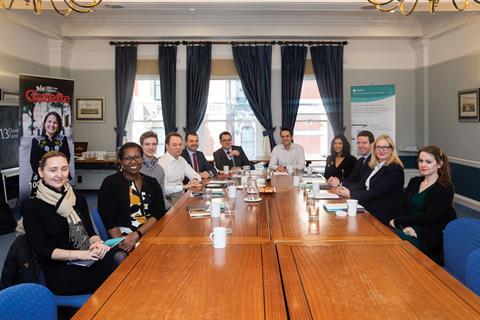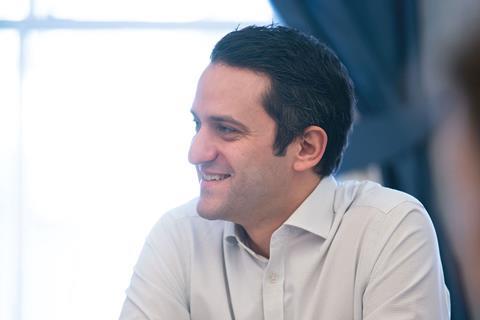More than a decade ago, the global financial crisis created huge challenges for in-house lawyers working in the private sector. Risk management has always been the defining feature of the in-house department’s job – and many found their ability to manage risk at a time of cuts or freezes on many legal budgets tested as never before. The mantra for in-house lawyers became ‘more for less’. Some worked for businesses and banks that failed, and the crisis exposed corporate wrongdoing and mistakes whose consequences continue to be felt.
But life in-house over this period has not just been characterised by crisis management. The growth in status and confidence of the in-house branch of the profession – evident before the crisis – continued. As legal spend recovered, many chose to expand their own departments to meet clients’ legal needs.
The turnover of the businesses represented at this Gazette roundtable was more than £36bn last year. Yet even for such high-calibre clients, law firms have risen to the task of meeting their needs unevenly, especially when it comes to cost.
Today, however, those present first identify their most urgent legal risks and regulatory concerns.
I struggle to see what valuable contribution the newly qualified – however bright he or she may be – makes when I can get a lot of lawyer for the same money in-house
Alessandro Galtieri, Colt Group
‘Very broadly, I would say compliance,’ begins Alessandro Galtieri of multinational telecommunications and data centre services company Colt Group. ‘Enforcement of a number of regulations has stepped up a notch. We’re probably at the midpoint of a decade of increased enforcement.’
Such compliance has ‘board attention’, he reflects, not least because ‘on these sorts of matters, the additional risk attached to the potential enforcement is even greater than the fine or the damage inflicted by enforcement’.
Galtieri also notes that significant attention is being paid to data protection, which even for a B2B company like Colt has moved up the agenda of risks that must be addressed.
Claire Larbey is general counsel to law firm Trowers & Hamlin, one of a growing number of law firm in-house lawyers. She adds that at her own firm colleagues have seen ‘real growth in being instructed in relation to regulatory global investigations, where you’re trying to manage different global regulators and their different approaches and rules, and looking into how you actually manage that for the corporate as a whole. We have seen a real move in that regulatory environment.’
In 2012 manipulation of inter-bank lending rates (IBORs) led to many countries choosing to phase out the use of the rates to support unsecured lending. Dependence on them has diminished, but they feature in many legacy contracts.
What is interesting is that the cost of external spend is going through the roof
Amanda Gill, Deutsche Bank
This is the first challenge Deutsche Bank’s Amanda Gill mentions. ‘A hot topic at the moment in Deutsche Bank is very much IBOR transition implementation,’ she says. Changing some products is particularly challenging and there are a number of industry forums where members are looking at how to address these.
Citi’s Sharon Blackman adds that environmental, social and governance standards feature in her in-tray, ‘as something where people are asking legal to get involved, particularly on the governance aspect’.
This roundtable is held three days before the UK’s exit from the European Union, but those present already know that the official departure date provides little certainty for their businesses. David Gossen, of global advisory-focused investment bank PJT Partners, says the ‘dislocation in regulation’ outlined in very broad terms by chancellor Sajid Javid means Gossen and colleagues will be tasked with dealing with the change ‘in a way that is least disruptive and least expensive for our business’.
We are asking law firms to show us more efficient ways of getting things done, and in large part the bigger law firms, particularly, have responded to that
Sharon Blackman, Citi
One attendee observes that on issues related to Brexit, ‘the solution to everybody’s problem is just to pass it on to the legal department’. But it is a mistake, Gill adds, to think of the legal team’s involvement being only to aid implementation at such a time. ‘It’s quite important that legal are involved in strategy,’ she notes, adding that this team needs to be ‘front and centre’.
The discussion turns to litigation and its costs, and those present identify some clear trends. ‘The cost of litigation continues to be very high in the big-ticket cases that are coming through,’ notes Molly Ahmed of consultancy Global Financial Experts.
Gossen says he observed an increase in litigation while working in a large bank. ‘Nothing to do with the recession,’ he says. ‘Just in terms of people, and society becoming more litigious; at least within corporate finance.’
‘I would agree that society in general is becoming more litigious,’ one attendee adds. ‘I would say we are becoming a little bit more Americanised in that sense.’
Larbey notes: ‘Claim amounts seem to be increasing as well, significantly. That is also driving the market.’
LOOKING FOR UNICORNS
In-house lawyers report an increase both in litigation and in the size of claim. What sits behind that? One factor is litigation funding – a market that has grown significantly in recent years, allowing claims to be brought that otherwise would not be backed by the finance sufficient to sustain an action.
‘I think it’s become quite a mature market,’ comments Molly Ahmed, in-house lawyer at Global Financial Experts, though she adds: ‘The parameters still remain the same in that they want cases with huge damages with high prospects of success, which are the unicorns.’ Other sources of backing, she notes, include the ‘family offices’ that manage the investments and affairs of wealthy families.
‘Very, very low interest rates and negative interest rates,’ she explains, mean family offices ‘are looking for ways to make money, because a lot of family offices are finding that, year on year, their capital is decreasing… So, litigation funding is actually quite an interesting sphere for them.’
The timing is possibly indicative, some reflect, but it is difficult to make a direct correlation.
One attendee relates that they have ‘probably have seen more class-action-type activities’.
Bills
Large institutions such as major banks commonly meet their external legal needs through a panel of law firms, with some discreet instructions also sent to non-panel firms. This reflects in part the advantages of a working relationship in which firms and clients will both have invested. It has also supposedly been a way to control knowledge, instructions and (of course) cost.
‘What is interesting is that the cost of external spend is going through the roof,’ Gill says. She has noticed that ‘law firms are paying their employees more’, as evidenced by the dramatic increase in newly qualified solicitor salaries in global and City firms. She speaks of ‘deals that have become extremely expensive as a result of higher hourly rates’ and notes a resulting ‘pressure on us to shop around or use some of the more cost-effective firms on our panel’.
Galtieri is openly unhappy: ‘It’s the sort of thing that [makes] my blood pressure go up, because frankly it’s very difficult for me to understand what is the value-add of a newly qualified’s legal price tag of £140,000. I genuinely struggle to see what valuable contribution the newly qualified, however bright he or she may be, makes when I can get a lot of lawyer for that in-house.’
Our roundtable is sponsored by Apperio, a legal spend tracking and analytics platform that provides clarity on legal spend in real-time. Chief technical officer Stephen Wilcock prompts knowing laughter and shakes of the head when he puts the rhetorical question: ‘Do you feel like it’s a market that’s functioning correctly in the sense that it’s supply- and demand-driven?’
Another attendee who asks for their comment to be unattributed, says: ‘This is the golden age of private practice, given how much they’re able to charge, and I would question the value of what we often get. That has led to significant internalisation.’
Apperio founder Nicholas d’Adhemar, a former CMS lawyer who has also worked in-house at an oil and gas company, suggests price data could help control some costs. ‘I think one of the challenges is actually being able to know what you’ve done historically,’ he says, ‘having a foundational layer of data to say, “Typically, we spend X and we spend it on the following kinds of items”… Is there a central ability to view information? You need to understand exactly what you’ve done.’
Businesses, several present reflect, ask for accurate cost predictions on legal spend but do not always behave in ways that support this. A general counsel may be happy for a matter to be dealt with by a second-, third- or fourth-tier firm, but a senior officer or the board may then insist on the ‘reassurance’ of a magic circle or global big-hitter.
It is also, of course, in the nature of business that the tasks and challenges for each year are different. As Blackman puts it: ‘It isn’t that you do 100 credit default swaps and know that you’re going to do 100 or 200 next year and 400 the year after.’ The chances are, she says, that ‘you’ll do the 200 credit default swaps and then somebody will say, “OK, now we want to do a TARN [targeted accrual redemption note]” … [then], “Right, we’ve done enough of those, we’re going to do an equity swap”. You’re just navigating that change and that forward drive of the business.’
One model which promised to deal with the issue of cost control and value is SMARTER. Developed by in-house lawyer Trevor Faure while at insurer Tyco, this involved a cross-border deal with a single supplier (Eversheds, now Eversheds Sutherland). In return for a fixed fee, the law firm committed to meeting the company’s legal needs and even to a reduction in costs year on year. It also committed to targets on diversity.
Galtieri has looked at the model and is sceptical about its suitability for all. ‘For many of us, that’s a solution in search of a problem,’ he says. ‘It works if you’re a very, very large – possibly American – company, where you’ve got, for instance, massive litigation spend… But it’s not something that would work for a company like mine, where you need to deal with 50 different languages, 30 different jurisdictions. There’s not enough volume of the same stuff… we’re just too diverse and too complex. So that could work if you’ve got a clearly identified set of activities, then you can do a made-to-buy solution, but I suspect that the needs [of many] are not as clear-cut.’
Legal technology is much in the news and law firms’ use of automation (and artificial intelligence) has been increasing. Are the benefits reaching clients? To a degree. Blackman is receptive: ‘We are asking them to do slightly different things, and they are coming up with interesting solutions – sometimes,’ she explains. ‘What we are asking the law firms to do is to try to show us more efficient ways of getting things done, and in large part the bigger law firms, particularly, have responded to that. They’ve got vastly more funds to target at tech build-outs, and so that’s one way that you can leverage and have your foray into what’s happening in the market from a tech perspective.’
One attendee uses the example of contract analysis, where a law firm recently demonstrated an automated process. ‘They’ve got this system [where] you scan in your contract and then it basically reads the contract,’ they note. While some of the advantages are speed and scale, ‘they were also demonstrating to us the cost savings associated with using that, and therefore that they can do a particular deal for us… for a fraction of the cost of what they used to be able to do it for’.
Apperio’s Wilcock mentions one challenge in the legal technology sector – the issues that arise as bespoke firm or client technology is involved in collaboration: ‘There’s definitely a place for large businesses to have internal technical teams building bits of software, but I think that one of the spaces that is the most difficult to execute is collaboration between businesses. The way we look at the market is as a two-sided network. There are law firms that work with many businesses, businesses that work with many law firms.’ That being the case, ‘an intermediary, a common platform is the right tool for the job’.
What change, the group is asked, would most help them in their current roles? ‘What would make my life easier is more resource generally, more headcount,’ Gill says. ‘The ability to internalise more than I currently do.’
‘More time’ is Blackman’s specific plea. ‘A relatively small amount of cash,’ Galtieri says, which would probably be spent on improved technology. Ahmed would like a product ‘which I don’t think exists’ – a ‘seamless product’ that combines the functions of programmes such as Excel and Word.
‘I think law firms are missing a trick in not having their junior lawyers be more in-house savvy,’ Gossen suggests.
Graveyard shift?
So much for the current challenges of working in-house. What are the attractions of working there when such rich rewards are available in private practice? ‘There was a historical perception that the in-house job was the graveyard for lawyers coming out of private practice and I think there has been a fundamental change,’ Gossen says. ‘I find my job to be extremely broad and very rewarding. Rewarding in terms of it’s very interesting – day in, day out. It also remunerates well. It doesn’t have that same negative connotation that historically it did.’
Blackman was aiming for a career at the bar when she took an in-house role with the aim of reapplying for pupillage the following year. ‘It was probably the best thing that I did because I’ve absolutely loved it,’ she says, with excellent chances for ‘growing, learning, developing’. ‘I’ve enjoyed the ride completely and I think I absolutely ended up in the right place. I would recommend it. I think people need to be more open to what is out there. When you have your legal qualification, what are you going to then go and do with it? Because the opportunities are endless.’
This roundtable discussion was kindly sponsored by Apperio







































2 Readers' comments